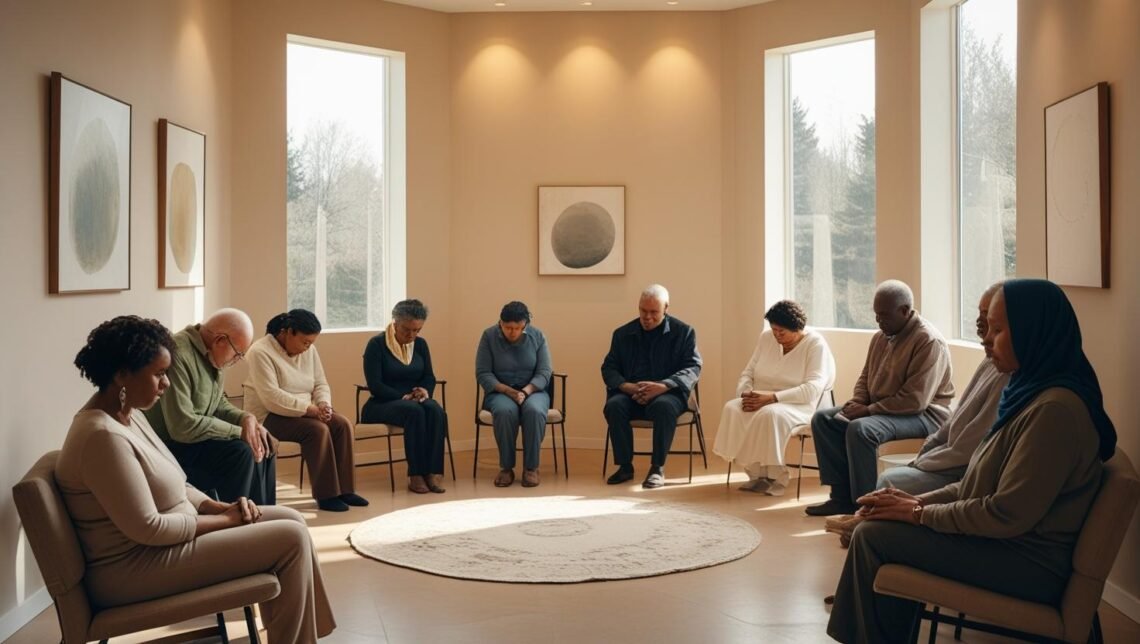On Silence, Lament, and the Unspeakable.
I remember sitting once in the chaplain’s office of a small hospice, where an elderly woman, her voice barely a whisper, told me she no longer had the words to describe her grief. “They’ve all worn out,” she said. “Used up like old rags.” She was not bitter. She was not even visibly sad. There was simply a silence that had grown so large it needed no explanation. We sat together, wordless, and something of the sacred moved in the stillness.
In an age that prizes articulation, productivity, and the endless performance of certainty, silence is an act of rebellion. Not the silence of avoidance, mind you, nor the strategic silence of plausible deniability, but the kind that arises when language fails us honestly. The silence of awe, of grief, of deep and abiding lament. The silence that hovers, almost holy, when a truth too raw for speech enters the room and finds that we, at least for now, are willing to stay.
There are things we cannot say. Not because we lack vocabulary, but because language itself cannot stretch far enough to hold the entire weight of sorrow, or wonder, or pain. We speak of war, but how can any phrase capture the shattering of a father’s cry as he finds his child beneath rubble? We speak of love, but what sentence could fully hold the quiet, unwavering presence of a friend who waits with us through the dark night of the soul?
The theologian Karl Rahner once observed that we are always trying to speak about God, and always failing, which is why we must also speak in silence. In much the same way, I think we are always trying to speak of the human experience, and always failing. Yet we keep trying. And when we cannot speak, we must learn to listen, and to honour the space between words.
Silence, of course, can be dangerous too. It can collude with violence, or cloak complicity. When silence becomes the absence of moral courage, it ceases to be sacred and becomes instead a kind of betrayal. But when it is chosen, not out of fear but out of fidelity to truth, it becomes a refuge. A pause, a breath, a refusal to speak falsely when truth has not yet ripened.
I sometimes think our culture is allergic to lament. We prefer soundbites to sorrow, productivity to pause, solutions to the slow work of grief. Yet in the great traditions of faith and poetry, lament is not a failure of language. It is its deepening. It allows words to stretch toward the ineffable, to tremble at the edge of what can be said, and to rest there for a while.
In lament, we do not speak to resolve. We speak to remember, to honour, to name. Or we fall silent when even naming is too much. That, too, is a kind of stewardship. Not every word must be spoken, not every pain explained. Some things must simply be carried, witnessed, and held.
I wonder what would happen if we built spaces in our public and private lives where such silence could be welcomed. Imagine a conversation in which silence was not a lull, but a gesture of reverence. A classroom where the moment after a profound question was not immediately filled, but allowed to echo. A church where the silence following a reading was as sacred as the scripture itself.
There is a deep moral and spiritual invitation here. In a world that floods our ears and eyes with opinion, outrage, and noise, to cultivate silence is to make space for the soul to speak. Or not to speak. Sometimes, even the soul must sit quietly and wait.
So let us be stewards, not only of words but of their absence. Let us honour the silence that tells the truth more faithfully than platitudes, and the lament that wails with greater honesty than explanation. Let us find ways to dwell in those thin spaces, where the unspeakable might still be heard.
This week, resist the urge to rush in with words. When you encounter suffering, your own or another’s, practice the discipline of presence without prescription. Allow a pause. Sit with silence. Make room for lament. And if a word must be spoken, let it rise slowly, like incense from the heart, rather than tumble forward in haste.





